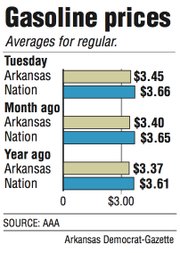Retail gasoline prices, which normally retreat as summer begins, are at the highest level since 2008 as turmoil in Iraq has pushed up the cost of crude oil, according to energy analysts.
RELATED ARTICLE
http://www.arkansas…">Shiite reprisal killings resurface
Prices at the pump in Arkansas have gained about 7 cents since last week and could continue to climb if unrest in Iraq intensifies or disrupts oil production in the country, analysts said.
"Normally we would be celebrating because gasoline prices would be coming down," said Phil Flynn, an energy analyst with Price Futures Group in Chicago. "It really could turn out to be a very long term situation, and it's a darn shame because, really if it wasn't for this violence in the world, the price of oil could be coming down substantially."
On Tuesday, the price of gasoline in Arkansas averaged $3.45 a gallon, up from $3.38 a week ago, according to AAA. The national average of a gallon of gasoline was $3.66, up from $3.65.
"Given the pressures in the industry right now, we will be paying more for gasoline than we are right now in the near future," said Mike Right, a spokesman for AAA. "I think we will probably pay more than last year."
He said the increase in U.S. oil production has so far helped soften the effect on prices created by international tensions.
Brent crude on Tuesday settled at its highest close since Sept. 9, Bloomberg News reported.
Brent for August delivery rose 51 cents to $113.45 a barrel on the ICE Futures Europe exchange as a result of the conflict in Iraq.
The price for West Texas Intermediate crude fell 54 cents to $106.36 a barrel on the New York Mercantile Exchange. Gasoline futures rose 1.93 cents to $3.09 a gallon.
Gasoline prices are slowly increasing rather than soaring because Iraqi oil is still flowing into the market. But prices, which are responding to the threat to supplies, could rise substantially if oil production is disrupted in southern Iraq, analysts said.
"If southern Iraq ever falls where all the production is, we could really see prices start to skyrocket," Flynn said.
The Iraqi government has been battling Sunni Muslim militants since insurgents captured territories in the north. President Barack Obama told Congress this week that as many as 275 troops could be sent to Iraq to protect the American Embassy.
So far, the conflict hasn't spread to southern Iraq.
"We haven't lost any supply," said Tom Kloza, chief oil analyst with gasbuddy.com.
While some states are hitting their highest prices of the year, the increase is not going to create a "tremendous demand disruption" and cause summer travelers to cancel their plans, Kloza said.
Iraq is the second largest producer in the Organization of the Petroleum Exporting Countries, according to the U.S. Energy Information Administration.
The country produces 3.45 million barrels of oil per day and exports about 2.67 million barrels per day, according to the International Energy Agency.
The United States imported about 341,000 barrels of Iraqi oil per day in 2013, according to the Energy Information Administration.
Oil exports from Iraq's terminals on the Persian Gulf are expected to surge, Bloomberg News reported.
"The southern part of the country is flourishing when it comes to production," said Flynn. "A lot of the world was starting to look at Iraq becoming a reliable oil producer."
Until the recent fighting, Iraq had become a stable oil supplier when other countries, such as Libya and Nigeria, have had supply disruptions, he said.
Now with the fighting and possible civil war, "a lot of those hopes are being put into question," Flynn said. "Until we get some more stability out of the country, we will have to take it one day at a time."
Business on 06/18/2014
